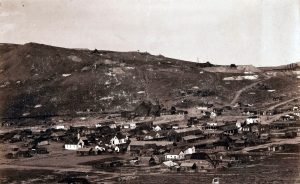On April 25, 1986 in the city of Chernobyl in the Soviet Union, Dr. Valentin Belokon was just getting back to his office from tending to a person that had an asthma attack, when he saw two explosions at the nuclear power plant. When he was informed by his paramedical assistant that there had been an explosion that released massive amounts of radiation, he immediately sent two ambulances to the site, with him in pursuit. When Dr. Belokon arrived at the site, an eighteen-year-old man was brought to him with a very severe headache. The young man kept vomiting and he had nausea. Other people came to Dr. Belokon with similar symptoms, along with others like dryness and a blocked throat. Many of them were also beginning to act in a very strange manner. They would lose their ability to speak and would be confused and disoriented. All of these people were suffering from radiation sickness caused by their exposure radiation.1

Many of the people that had experienced the radiation first-hand were hospitalized and were being treated for radiation sickness.2 The numbers of those affected dramatically increased in the following months, as it was estimated that 600,000 people were exposed to the radiation. Victims were sent to different areas, due to the high number of people that needed to be examined and treated. Those that showed no sign of medical issues were sent home and asked to come back the following day for a follow-up examination. Patients that were sick, however, remained in the hospital and were seen by “the best scientific and medical specialists of the country, from specialized clinics in Moscow and other cities.”3 The patients stayed for months in the hospital, such as Dr. Belokon himself, who was discharged in the fall of 1986. Many of them were permanently damaged and affected by the radiation.4
The biggest problem that arose from the absorption of the radiation, apart from the radiation sickness, was that those who were exposed would pass on the health problems that the radiation caused to generations to come. The rates of cancer would surely rise in later years, especially thyroid cancer, as the thyroid would absorb much of the radiation.5 Other problems that would arise would be immune system deficiencies, cardiovascular diseases, and deformities in the children of those who were exposed to the high amounts of radiation. These health problems would arise due to the fact that the massive amounts of radiation absorbed ultimately changes the genetic structure of those that were affected and their offspring.6 The estimated number of deaths that would be caused from the indirect exposure of the radiation was set to approximately 4,000.7

Chernobyl was one of the biggest radiation disaster that has occurred in history. Thousands of people were affected by the biological and internal problems that the radiation caused. Many people are still being treated for cancers and other illnesses that can be traced back to the explosion. There were also many deaths that were caused throughout due to the nuclear power plant accident that occurred in the city of Chernobyl.
- Zhores A. Medvedev, The Legacy of Chernobyl (New York: W.W. Norton 1990), 132-133. ↵
- Zhores A. Medvedev, The Legacy of Chernobyl (New York: W.W. Norton 1990), 136. ↵
- Mikhail Gorbachev, “Vital speeches of the Day,” June 26,1986. ↵
- Zhores A. Medvedev, The Legacy of Chernobyl (New York: W.W. Norton 1990), 136. ↵
- Adriana Petryna, Life Exposed: Biological Citizens After Chernobyl ( New Jersey: Princeton University Press 2003), 1-2. ↵
- Aleksandra Fucic, “Follow up studies on genome damage in children after Chernobyl nuclear power plant accident,” Archives of Toxicology 9, no.9 (June 2016): 2147-2155. ↵
- Columbia Electronic Encyclopedia, 2017, s.v. “Chernobyl.” ↵



56 comments
Sebastian Castro Ramos
How devastating the consequences of the Chernobyl accident were. This event reflects the dangers of nuclear plants, because not only the people who lived in Chernobyl on the time of the accident were affected, but all of their descendants as well. The diseases and problems caused by the exposure to radiation are disastrous. And even today there is radiation on Chernobyl, and will be unsafe for many more years.
Tyler Bradford
I have to say the story of Chernobyl is somewhat terrifying honestly because it’s scary to think about all of the people who were effected temporarily and permanently all due to the amounts of radiation they were exposed to. The consequences of radiation is the really scary part because 600,000 people were effected. 600,000 is not a small number and we really need to be aware of the consequence that could result from radiation otherwise, it could possibly effect more than 600,000 people the should it happen again.
Joel Gracia
I have always found the story of Chernobyl to be, while terrifying, fascinating. It is disturbing to know that these nuclear plants that can seriously harm whoever is around them are sometimes extremely close to civilized areas, or even purposely placed in the middle of a city for protection reasons. This seems incredibly dangerous to me, and I hope that the world never has to see the devastating reprecussions of a nuclear disaster again.
Mariah Cavanaugh
I have read a few stories that covered the Chernobyl explosion and I am fascinated by the footage of Pripyat which looks exactly as it was left 30 years ago. I cannot begin to fathom what it must have felt like for these people. They were poisoned within their own homes, a place where they felt safe. I knew the large impact the explosion had but I did not realize that 600,00 people were exposed to radiation poisoning.
Josselyn Arrieta-Meraz
Although technology advancements are created for a greater good of the country and development, but to think that this too carries many dangerous effects, is really devastating to hear especially in the case of Chernobyl for the people in Russia who will never forget such event, but because such events happen sometimes as humans we can not let go of the product it gives us although we run the risk of it happening to us as well, because we are at a point where if we turn around the possibility rises all over again.
Maria Callejas
Great article! A couple years ago I saw a documentary of present-day Chernobyl. It’s a total ghost town. Empty buildings, decaying homes. All evidence of the horrendous tragedy. I have to highlight that your usage of media is top notch. Your images show the reality of this event, and how it shattered the lives of over 600,000 people. This atrocity goes to show the how dangerous chemical warfare is, and how precautions countries have to be when dealing with radioactivity.
Richard Navarro
For some reason I think it would be pretty cool to visit Chernobyl. After I saw the movie, I wonder what goes on at night in that area. Is it really what people say it is? Is it quiet? Or how are the animals? Anyways, this is a very interesting article. I wonder if people’s children are still affected by what Chernobyl did.
Veronica Spryszynski
I remember in my history class talking about this topic. T he radiation spread very far and today it is still a high radiation site. I wonder how the explosion started; what caused it. Its unfortunate for the later generations to have medical condition due to the passing down of the sickness. Luckily they had called many doctors and scientists t come and help the incident.
Lauryn Hyde
It is sad to think that this event occurred only about 30 years ago. The issues surrounding nuclear war is still relevant today. With everything concerning the possibility of nuclear war starting from North Korea it is a big concern on the effects that nuclear radiation will have on the people. The scary thing about nuclear warfare is that we not only have to worry about the ground hit, but the radiation weeks and months after the bombing.
Edith De Loera
While nuclear power is a great advancement for the human race, we also have to take in to consideration the consequences that may come with nuclear energy. The tragedy in Chernobyl is still felt today, so many years later. Experts even conclude that various cancer deaths may eventually still be traced back to Chernobyl. Great story, highlighting many different interesting points.